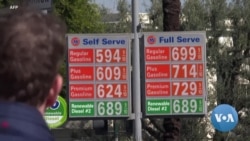ສຳລັບປະທານາທິບໍດີ ໂຈ ໄບເດັນ ແລ້ວ ຄວາມເຈັບປວດຂອງຊາວອາເມຣິກັນ ທີ່ຮູ້ສຶກໃນກະເປົາເງິນຂອງພວກເຂົານັ້ນ ກໍສະຫລຸບໄດ້ ໃນຄຳຂວັນທີ່ອອກມາຊ້ຳແລ້ວຊ້ຳອີກວ່າ “ລາຄາສູງຂຶ້ນຍ້ອນປູຕິນ”. ເປັນເວລານຶ່ງເດືອນມານີ້ ລັດຖະບານຂອງທ່ານ ໄດ້ພະຍາຍາມທີ່ຈະຖິ້ມໂທດໃນການສູງຂຶ້ນຂອງລາຄານັ້ນ ໃສ່ການບຸກລຸກຢູເຄຣນ ຂອງປະທານາທິບໍດີ ຣັດເຊຍ. ແຕ່ຄວາມຈິງແລ້ວ ມັນສັບສົນຫຼາຍ ຕາມການກ່າວຂອງບັນດານັກວິເຄາະ. ນັກຂ່າວວີໂອເອ ປະຈຳທຳນຽບຂາວ ອານິຕາ ພາວແວລ ລາຍງານມາຈາກວໍໍຊິງຕັນ ຊຶ່ງໄຊຈະເລີນສຸກ ຈະນຳລາຍລະອຽດມາສະເໜີທ່ານ ໃນອັນດັບຕໍ່ໄປ.
ນັບຕັ້ງແຕ່ສົງຄາມໃນຢູເຄຣນ ໄດ້ເລີ້ມຂຶ້ນເກືອບ 7 ອາທິດຜ່ານມາ ລາຄາຕ່າງໆໄດ້ສູງຂຶ້ນ ແລະບໍ່ພຽງແຕ່ສຳລັບຊາວອາເມຣິກາເທົ່ານັ້ນ.
ລາຄາຂອງທຸກຢ່າງຈາກນ້ຳມັນເຊື້ອໄຟ ຫາປຸຍ ແລະອາຫານ ແມ່ນສູງຂຶ້ນຢູ່ທົ່ວໂລກ ໃນປະເທດຕ່າງໆຫ່າງອອກໄປໄກຈາກບັນຫາຂັດແຍ້ງ ຄືປະເທດໂມ ຣອກໂກ ບຣາຊີລ ແລະອິນເດຍ.
ປະທານາທິບໍດີ ໂຈ ໄບເດັນ ໄດ້ຄິດຄຳຂວັນຂອງຕົນເອງຂຶ້ນມາ ທີ່ຈະອະທິ ບາຍຄຳຂວັນທີ່ວ່າ: “ລາຄາສູງຂຶ້ນຍ້ອນປູຕິນ.”
ປະທານາທິບໍດີ ໂຈ ໄບເດັນ ເວົ້າວ່າ “ຂ້າພະເຈົ້າເຮັດທຸກສິ່ງທຸກຢ່າງພາຍໃນອຳນາດຂອງຂ້ອຍ ດ້ວຍຄຳສັ່ງຝ່າຍບໍລິຫານ ເພື່ອນຳເອົາລາຄາໃຫ້ຫລຸດລົງ ແລະແກ້ໄຂລາຄາທີ່ສູງຂຶ້ນຂອງປູຕິນ. ໃນຄວາມເປັນຈິງ ພວກເຮົາໄດ້ທຳຄວາມກ້າວໜ້າຢູ່ແລ້ວ ນັບຕັ້ງແຕ່ຂໍມູນພາວະເງິນເຟີ້ໃນເດືອນມີນາ ໄດ້ຖືກເກັບກຳ. ງົບປະມານຂອງຄອບຄົວເຈົ້າ ຄວາມສາມາດຂອງເຈົ້າທີ່ຈະຕື່ມຖັງນ້ຳມັນໃຫ້ເຕັມ ບໍ່ມີອັນໃດຄວນຕິດພັນກັບຜະເດັດການ ທີ່ປະກາດສົງຄາມ ແລະທຳການຂ້າລ້າງເຊື້ອຊາດເຜົ່າພັນ ທີ່ຫ່າງໄກເຖິງເຄິ່ງນຶ່ງຂອງໂລກ ຫຼືບໍ່ນັ້ນ.”
ໃນລະຫວ່າງການຢ້ຽມຢາມລັດໄອໂອວາ ໃນວັນອັງຄານຜ່ານມາ ທ່ານໄດ້ຍົກເອົາເປີເຊັນຂອງສານເອທານໍ (ethanol) ທີ່ສາມາດປະສົມເຂົ້າກັບນ້ຳມັນເຊື້ອໄຟ-ອັນເປັນການເຄື່ອນໄຫວທີ່ຈະລຸດຜ່ອນລາຄານ້ຳມັນເຊື້ອໄຟ ແຕ່ຍ້ອນຄວາມສ່ຽງໃນການສ້າງຄວັນຫຼາຍຂຶ້ນຕື່ມ.
ການບຸກລຸກຢູເຄຣນຂອງຣັດເຊຍ ໄດ້ເຫັນລາຄາສິນຄ້າອາຫານການກິນ ສູງຂຶ້ນໃນທົ່ວໂລກ ໂດຍອົງການອາຫານຂອງສະຫະປະຊາຊາດ ກ່າວວ່າ ສົງຄາມໄດ້ຂັບດັນລາຄາໃຫ້ສູງຂຶ້ນເຊັ່ນ ເຂົ້າເບລ່ ສາລີ ແລະນ້ຳມັນພືດຜັກ.
ແຕ່ບັນດານັກເສດຖະສາດ ຍັງເນັ້ນໜັກເຖິງແນວໂນ້ມຂອງລາຄາສິນຄ້າທີ່ສູງຂຶ້ນເລື້ອຍໆຢ່າງກວ້າງຂວາງແລະຍາວນານກວ່າເກົ່າ, ນະໂຍບາຍເພື່ອສະໜັບສະໜຸນໃນພາວະເງິນເຟີ້ ການເປີດເຜີຍກ່ຽວກັບການຈຳກັດຄວາມຕ້ອງການ ແລະການລົບກວນຕໍ່ຕ່ອງໂສ້ການສະໜອງສິນຄ້າ.
ບັນດານັກວິເຄາະອະນຸລັກນິຍົມ ກ່າວວ່າ ປູຕິນ ບໍ່ແມ່ນຜູ້ກໍ່ເລື້ອງພຽງຄົນດຽວ ຫຼືແມ່ນກະທັງເປັນຜູ້ໃຫຍ່ທີ່ສຸດຄົນນຶ່ງ.
ທ່ານອີເຈ ແອນໂທນີ ນັກຄົ້ນຄວ້າປະຈຳສູນຂໍ້ມູນເພື່ອການວິເຄາະຢູ່ມູນນິທິເຮຣີເທັຈ (Heritage Foundation) ກ່າວວ່າ “ອັນນີ້ໄດ້ເກີດຂຶ້ນດົນມາແລ້ວກ່ອນການບຸກລຸກຢູເຄຣນຂອງປູຕິນ. ສະນັ້ນ ຄະນະບໍລິຫານຂອງລັດຖະບານ ຈາກທີ່ໄດ້ກ່າວໄປວ່າ ‘ບໍ່ມີພາວະເງິນເຟີ້ເລີຍ’ ມາບັດນີ້ກ່າວວ່່າ ‘ເອີ ມີພາວະເງິນເຟີ້, ແຕ່ມັນເປັນໄລຍະຊົ່ວຄາວ. ສະນັ້ນ ບໍ່ຕ້ອງເປັນຫ່ວງກ່ຽວກັບມັນ.’ ແລະຈາກນັ້ນມາ ພາວະເງິນເຟີ້ ໄດ້ກາຍເປັນບັນຫາສຳລັບພວກຄົນຊັ້ນສູງ. ແລະຕໍ່ມາ ໃນທີ່ສຸດ ພາວະເງິນເຟີ້ ກໍດີ. ດຽວນີ້ ມັນເປັນຄວາມຜິດພາດຂອງປູຕິນ. ຂ້າພະເຈົ້າຄາດຄະເນວ່າ ປະມານ 8 ເປີເຊັນຂອງ 8.5 ເປີເຊັນທີ່ໄດ້ຮັບມານັ້ນ ພວກເຮົາໄດ້ເຫັນ ຕະຫຼອດໄລຍະປີກາຍນີ້ ບໍ່ມີຫຍັງກ່ຽວຂ້ອງກັບການບຸກລຸກຢູເຄຣນເລີຍ. ອັນນັ້ນພຽງເປັນປາກົດການເມື່ອມໍ່ໆມານີ້. ແລະມັນບໍ່ອະທິບາຍການເພີ້ມສູງຂຶ້ນຂອງລາຄາ ໂດຍສະເພາະລາຄາພະລັງງານ ກ່ອນໜ້າການບຸກລຸກ.”
ສ່ວນຄົນອື່ນໆກ່າວວ່າ ປູຕິນ ສົມຄວນໄດ້ຮັບການຕ້ອງຕິຫຼາຍກວ່າ.
ທ່ານວີລລຽມ ຣາຍນສ໌ ຈາກສູນກາງດ້ານຍຸດທະສາດແລະການສຶກສາລະຫວ່າງປະເທດ ກ່າວວ່າ “ຖ້າບໍ່ມີສົງຄາມ ຂ້າພະເຈົ້າຄິດວ່າ ເຈົ້າອາດໂຕ້ຖຽງວ່າ ລາຄາອາດຈະສູງຂຶ້ນສຸດ ແລະເລີ້ມຫລຸດລົງ. ໂດຍມີສົງຄາມ ແມ່ນແລ້ວ ມັນເປັນການຂຶ້ນລາຄາຍ້ອນປູຕິນ. ຂ້າພະເຈົ້າຄິດວ່າ ບໍ່ມີຄຳຖາມກ່ຽວກັບມັນເລີຍ. ດັ່ງທີ່ຂ້າພະເຈົ້າໄດ້ກ່າວໄປກ່ອນນັ້ນ ເຈົ້າຮູ້ດີ ລາວບໍ່ໄດ້ເລີ້ມມັນ. ທັງໝົດນີ້ ໄດ້ເລີ້ມຂຶ້ນ ກ່ອນໜ້າສົງຄາມພຸ້ນ. ແຕ່ລາວໄດ້ເຮັດໃຫ້ທຸກສິ່ງທຸກຢ່າງຮ້າຍແຮງຂຶ້ນ ແລະລາວສົມຄວນໄດ້ຮັບສ່ວນຂອງການຕ້ອງຕິສຳລັບອັນນັ້ນ.”
ເສດຖະກິດຂອງຣັດເຊຍ ເຊັ່ນກັນ ໄດ້ຖືກກະທົບໜັກ ໂດຍຄື້ນຟອງຂອງມາດຕະການລົງໂທດ ທີ່ໄດ້ຖືກວາງໃສ່ໂດຍສະຫະລັດ ແລະບັນດາພັນທະມິດໃນອົງການເນໂຕ້. ທະນາຄານກາງແຫ່ງຊາດຂອງຣັດເຊຍ ໄດ້ຊຸກຍູ້ເງິນຣູໂບຂຶ້ນໂດຍການຍົກອັດຕາດອກເບ້ຍຂຶ້ນຢ່າງຫຼວງຫຼາຍແລະວາງການຄວບຄຸມອື່ນໆ.
For President Joe Biden, the pain Americans are feeling in their pocketbooks comes down to an increasingly repeated slogan: "Putin's price hike." For more than a month now, his administration has tried to blame rising prices on the Russian president's invasion of Ukraine. But the truth is a little more complicated, analysts say. VOA White House correspondent Anita Powell reports from Washington.
Since the war in Ukraine began nearly seven weeks ago, prices are rising — and not just for Americans.
The price of everything from gas to fertilizer to food is rising across the globe in countries as far from the conflict as Morocco, Brazil and India.
President Joe Biden has minted his own slogan to explain it: the "Putin price hike."
President Joe Biden
"I'm doing everything within my power, by executive order, to bring down prices and address the Putin price hike. In fact, we've already made progress since March inflation data was collected. Your family budget, your ability to fill up your tank, none of it should hinge on whether a dictator declares war and commits genocide half a world away."
During a visit to Iowa Tuesday, he raised percentage of ethanol that can be blended into gasoline — a move that will tamp down gas prices but at a risk of creating more smog.
Russia's invasion of Ukraine has seen a rise in global food commodity prices, with the United Nations food agency saying the war has driven rises in wheat, maize and vegetable oil.
But economists also cite a broader, longer trend of rising commodity prices, policy support for inflation, the release of pent-up demand and disruptions to the supply chain.
Conservative analysts say Putin is not the sole culprit — or even the biggest one.
EJ Antoni, Heritage Foundation
"This happened long before Putin's invasion of Ukraine. So, the administration went from saying, 'There is no inflation' to then saying, 'Well, there's inflation, but it's transitory. So, don't worry about it.' And then inflation became a high-class problem. And then finally, inflation was good. Now, they have flipped the script yet again. Not only is inflation bad, but now it's not their fault. Now, it's Putin's fault. I estimate that about 8 percentage points of the 8.5 percentage point gain we've seen over the last year has nothing to do with the invasion of Ukraine. That is only a recent phenomenon. And it does not explain the run up in prices, particularly energy prices from before the invasion."
Others say Putin deserves a bigger share of the blame.
William Reinsch, Center for Strategic and International Studies
"Had there been no war, I think you could argue that prices would have peaked and began to decline. With the war, yes, it is a Putin price hike. I think there's no question about it. As I said before, you know, he didn't start it. All this started way before the war. But he's made everything worse, and he deserves a good share of the blame for that."
Russia's economy, too, has been hard-hit by the waves of sanctions imposed by the U.S. and NATO allies. The nation's central bank has propped up the ruble by dramatically raising interest rates and imposing other controls.





